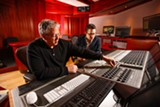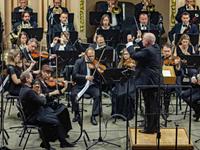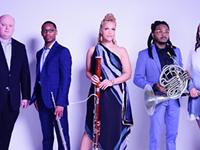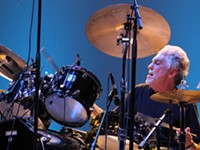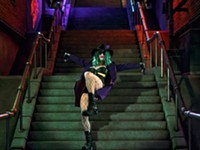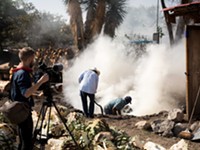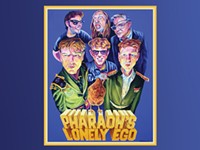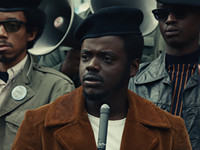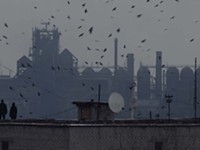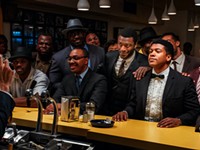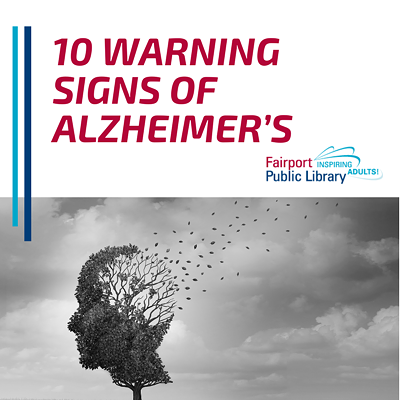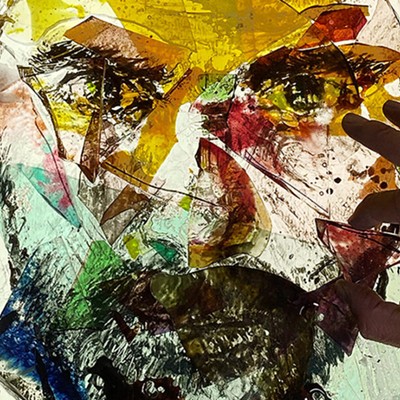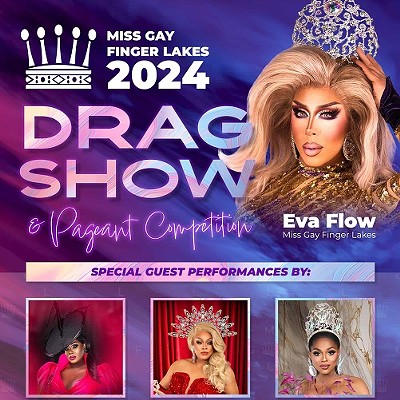[
{
"name": "500x250 Ad",
"insertPoint": "5",
"component": "15667920",
"parentWrapperClass": "",
"requiredCountToDisplay": "1"
}
]
Like chocolate and peanut butter, jazz and the movies are two great tastes that taste great together. And Rochester can't get enough of either. This Thursday, those two tastes come together at the 2018 Xerox Rochester International Jazz Festival with "Jazz Goes to the Movies." The concert, presented by the Eastman School's Beal Institute of Film Music and Contemporary Media, will highlight fantastic jazz scores from across film history.
Beal Institute Director Mark Watters will conduct the 25-piece Eastman All Stars Big Band, with featured flutist Sara Andon, through selections from classic and contemporary jazz film scores by artists from ranging from Lalo Schifrin and Duke Ellington to Leonard Bernstein and Randy Newman.
CITY spoke with Watters by phone while he was I. Los Angeles to talk about the role of jazz in film music history and how this swingin' concert came together. What follows is an edited and condensed transcript of our chat. Go online to rochestercitynewspaper.com for a longer version.
CITY: What was the process for selecting the pieces being performed on Thursday?
Mark Watters: Well, the difficult thing was trying to confine it to just one concert. There were a lot of scores that we wanted to do — and there's certainly enough music to do several concerts, so we're hoping for it to be a continuing thing. But I wanted to find a mixture of different time periods. Jazz in movie scores kind of started in the mid-50's and reached its peak creatively in the 60's, so we've got several scores that are from that period, but also a couple that are more contemporary.
Is the set entirely jazz scores, or will you be putting a jazz spin on scores that aren't necessarily of that genre?
Almost all of them are jazz scores to begin with. We are doing one jazz version of a tune from "Toy Story" that was actually used as the end credits for "Toy Story 2." It's a delightful jazz version of the great Randy Newman song "You've Got a Friend in Me," but Randy supervised the arrangement of it, and it's really wonderful.
This concert features the Eastman All Stars Big Band and flutist Sara Andon. How are specific groups or musicians selected for these types of performances?
Being somewhat new to Rochester, I relied on my colleagues at the school. The Media Composition curriculum is under the auspices of the Jazz Education program, and so I'm technically in the jazz department. Between all our interaction at the school, I've become good friends with all the jazz faculty. So all of them are playing. Then it was just a matter of getting their recommendation for either players who were at the top of their list of current students, or outstanding alumni who still live in the area and were available to play.
This will be the first time this band has been put together and there's just enormous enthusiasm from the players. And I'm also very excited to introduce Sara to the audience in Rochester. I actually worked with her yesterday at a recording session here in Los Angeles. She's a first call studio player and just has the most gorgeous, legit sound, and she can improvise jazz. She's just such a unique player. I think she's going to really wow the audience.
After the Q&A following the film music documentary "Score," you talked about how difficult it can sometimes be to obtain certain printed film scores for performance purposes. How much did that factor into which scores you were able to use in this concert?
It was really just knowing where to go. We're getting several of the scores from Varèse Sarabande, which is the preeminent soundtrack CD company. Robert Townson who runs that company is a good friend of mine and he was very helpful in getting the Elmer Bernstein and Lalo Schifrin scores. The school actually has a great suite from "Anatomy of a Murder," by Duke Ellington.
I'm doing a new arrangement of Henry Mancini's "Lujon," a beautiful tune that he wrote in the 60's. And then I had a friend who worked on the movie "Swing Kids," who'd done a fabulous recreation of the original Benny Goodman version of "Sing Sing Sing" for that movie, and he was generous to let us use that. This will be the first time it's ever been performed live. So you've just gotta hunt and search and know who to call.
Will there be any other scores played that will be difficult to hear anywhere else?
Well, there aren't many big band jazz movie concerts. There has been a resurgence in doing film music live in concert, but those are with symphonies, so there aren't a great deal of big band concerts specifically devoted to this. And these pieces may have been recorded, but I dare say none of these have been performed more than a half dozen times. We're doing two selections from "Bullitt" by Lalo Schifrin, and a suite from "On the Waterfront" by Leonard Bernstein. Those have rarely been performed. I think "On the Waterfront" has only been performed once in this country. There are some film music festivals in Europe and it was performed once there, but I'm very excited about doing these charts for the first time in the United States.
I mean probably the most popular — and we're going to open the concert with it — is Lalo's own arrangement of the theme for "Mission: Impossible," which I never get tired of hearing. And the fact that when they started making the feature films, they certainly couldn't do it without taking that iconic theme with them. It is such a great, great theme, and his arrangement is very, very exciting.
Do you have any favorite jazz scores that you weren't able to get into the show?
Well, I contacted [composer] Johnny Mandel and I wanted to do the score from "I Want to Live!," which was written in 1957. Great jazz score. I was really looking forward to premiering a suite from it, but Johnny just wasn't able to gather up all the scores and the parts for me to do it. I would have loved to have done that.
Since this is a big band concert and we don't have strings, there were a lot of scores that I'm hoping in subsequent years we can do a concert with a full orchestra, because there are scores like "Chinatown" and "L.A. Confidential" and "Catch Me If You Can," scores that require a full symphony to do. So I'm hoping that we'll do that in the future. I was also hoping to find a singer to do a couple of tunes, but unfortunately we just didn't have the budget to do that this year. But I'm hoping with the success of this one, that we'll get more excitement about it will be able to bring out a singer to do some songs next time.
I realize this is a broad question, but generally speaking, how has the use of jazz in film scores evolved over time?
When jazz was first used in motion picture scores, it was usually used to display sleaziness or alcoholism or drug addiction or overt sexuality. That was how the language of jazz was interpreted. There's a great story about how Alex North, when he wrote his score to "A Streetcar Named Desire," the League of Decency made him go back and tone down some of the sexuality of the score before the film to be released. So he had to take out all the sultry saxophone solos and replace it with a clarinet, and that toned down the overt sexuality of it. I had the pleasure of discussing that with Alex shortly before he died, and he just kinda laughed about it. He said it was just a different era back then.
But eventually the great composers started figuring out that they could use jazz for something more evocative, more intriguing. With the great caper movies of the 60's, "The Pink Panther" and movies like that, jazz became the perfect language for mystery and suspense. And it kind of legitimized jazz as an art form, I think, by seeing it as something that it wasn't necessarily bad or representing something that was a unsavory.
Obviously jazz is a genre of music with a huge fanbase. Do you think the jazz element helps bring in a different audience that might not generally listen to film scores on their own?
I hope so. I mean, there's been so much talked about how John Williams brought a whole new audience to the symphony world because of his great, sophisticated scores. And I certainly hope that there's a fan base out there for jazz and for jazz used as dramatic storytelling. The big thing now in the concert world is to do entire movies live to picture, like the "Harry Potter" series, "E.T.," and "Star Wars." I would love to do something like that. I'd love to do "Chinatown" live to picture or even "Anatomy of a Murder," which has a huge amount of music that flows throughout the movie, and it would be just a great, great treat to hear that music live. That's definitely on my bucket list.
